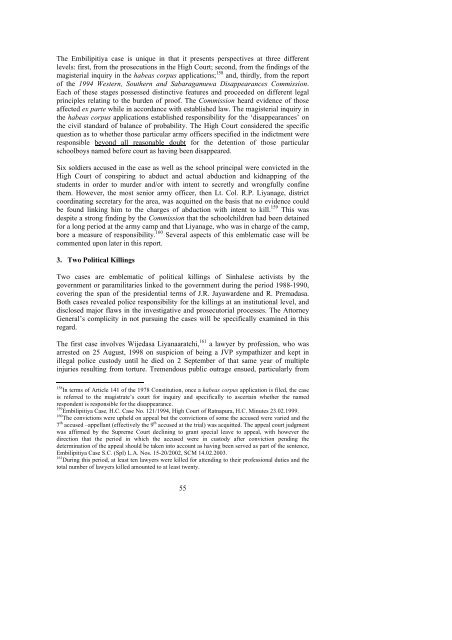Untitled - International Commission of Jurists
Untitled - International Commission of Jurists
Untitled - International Commission of Jurists
Create successful ePaper yourself
Turn your PDF publications into a flip-book with our unique Google optimized e-Paper software.
The Embilipitiya case is unique in that it presents perspectives at three different<br />
levels: first, from the prosecutions in the High Court; second, from the findings <strong>of</strong> the<br />
magisterial inquiry in the habeas corpus applications; 158 and, thirdly, from the report<br />
<strong>of</strong> the 1994 Western, Southern and Sabaragamuwa Disappearances <strong>Commission</strong>.<br />
Each <strong>of</strong> these stages possessed distinctive features and proceeded on different legal<br />
principles relating to the burden <strong>of</strong> pro<strong>of</strong>. The <strong>Commission</strong> heard evidence <strong>of</strong> those<br />
affected ex parte while in accordance with established law. The magisterial inquiry in<br />
the habeas corpus applications established responsibility for the ‘disappearances’ on<br />
the civil standard <strong>of</strong> balance <strong>of</strong> probability. The High Court considered the specific<br />
question as to whether those particular army <strong>of</strong>ficers specified in the indictment were<br />
responsible beyond all reasonable doubt for the detention <strong>of</strong> those particular<br />
schoolboys named before court as having been disappeared.<br />
Six soldiers accused in the case as well as the school principal were convicted in the<br />
High Court <strong>of</strong> conspiring to abduct and actual abduction and kidnapping <strong>of</strong> the<br />
students in order to murder and/or with intent to secretly and wrongfully confine<br />
them. However, the most senior army <strong>of</strong>ficer, then Lt. Col. R.P. Liyanage, district<br />
coordinating secretary for the area, was acquitted on the basis that no evidence could<br />
be found linking him to the charges <strong>of</strong> abduction with intent to kill. 159 This was<br />
despite a strong finding by the <strong>Commission</strong> that the schoolchildren had been detained<br />
for a long period at the army camp and that Liyanage, who was in charge <strong>of</strong> the camp,<br />
bore a measure <strong>of</strong> responsibility. 160 Several aspects <strong>of</strong> this emblematic case will be<br />
commented upon later in this report.<br />
3. Two Political Killings<br />
Two cases are emblematic <strong>of</strong> political killings <strong>of</strong> Sinhalese activists by the<br />
government or paramilitaries linked to the government during the period 1988-1990,<br />
covering the span <strong>of</strong> the presidential terms <strong>of</strong> J.R. Jayawardene and R. Premadasa.<br />
Both cases revealed police responsibility for the killings at an institutional level, and<br />
disclosed major flaws in the investigative and prosecutorial processes. The Attorney<br />
General’s complicity in not pursuing the cases will be specifically examined in this<br />
regard.<br />
The first case involves Wijedasa Liyanaaratchi, 161 a lawyer by pr<strong>of</strong>ession, who was<br />
arrested on 25 August, 1998 on suspicion <strong>of</strong> being a JVP sympathizer and kept in<br />
illegal police custody until he died on 2 September <strong>of</strong> that same year <strong>of</strong> multiple<br />
injuries resulting from torture. Tremendous public outrage ensued, particularly from<br />
158 In terms <strong>of</strong> Article 141 <strong>of</strong> the 1978 Constitution, once a habeas corpus application is filed, the case<br />
is referred to the magistrate’s court for inquiry and specifically to ascertain whether the named<br />
respondent is responsible for the disappearance.<br />
159 Embilipitiya Case, H.C. Case No. 121/1994, High Court <strong>of</strong> Ratnapura, H.C. Minutes 23.02.1999.<br />
160 The convictions were upheld on appeal but the convictions <strong>of</strong> some the accused were varied and the<br />
7 th accused –appellant (effectively the 9 th accused at the trial) was acquitted. The appeal court judgment<br />
was affirmed by the Supreme Court declining to grant special leave to appeal, with however the<br />
direction that the period in which the accused were in custody after conviction pending the<br />
determination <strong>of</strong> the appeal should be taken into account as having been served as part <strong>of</strong> the sentence,<br />
Embilipitiya Case S.C. (Spl) L.A. Nos. 15-20/2002, SCM 14.02.2003.<br />
161 During this period, at least ten lawyers were killed for attending to their pr<strong>of</strong>essional duties and the<br />
total number <strong>of</strong> lawyers killed amounted to at least twenty.<br />
55
















